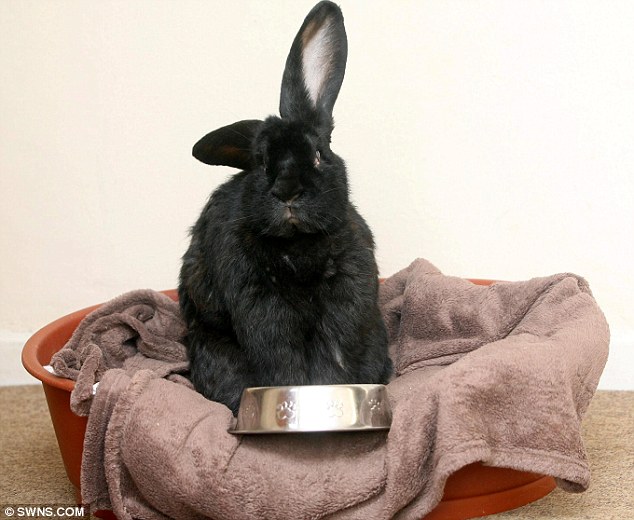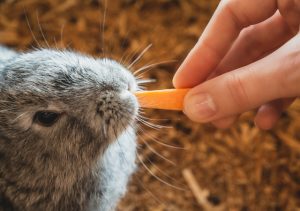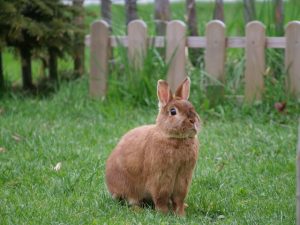
According to experts, when it comes to eating, rabbits are probably more similar to cows, horses and guinea pigs than cats, ferrets, rodents and dogs. Rabbits are designed to graze throughout the day, rather than ingest their daily ration in a single sitting. Dogs as well as other animals can eat only once or twice a day but going without food for a certain period may make a rabbit seriously ill.
Should I give my Rabbit Dog Food? No
Rabbits love to eat; they can and do eat a large variety of food. Rabbits are not the pickiest pets and have a tendency to nibble on almost anything. Keeping this in mind, it this doesn’t mean that they should be able to eat anything they want.
If your rabbit has tasted dog food, maybe ate the dog pellets left out for a schnauzer or you wanted to try something different for your pet, refrain from doing this because it is always best to give your rabbit food that addresses the food needs of rabbits.
Dog food contains components that are not good for rabbits and their health. For example, animal protein, rabbits are herbivores and high protein products are not the most nutritious food option for them.
Susan Brown, DVM of Veterinary Partner says it is dangerous for a rabbit to snack on dog or cat food. These foods are designed for carnivores, not for herbivores. Dog food is high in protein and fat as well as carbohydrates in the form of grains, usually corn. Although rabbits are able to eat small amounts of dog or cat food and appear to be normal, there can be insidious changes that take place over time. A rabbit’s consumption of excessive levels of protein can lead to kidney damage; excessive levels of fat and grain-based carbohydrates can lead to obesity.
Doctor Brown further elaborates; the most dangerous side effect in rabbits who eat dry dog or cat food is the disturbance of the normal intestinal flora that will ultimately lead to intestinal distress and death. There have been cases where rabbits have become seriously ill and pass away within 24 hours of eating dog food due to acute intestinal disorders.
Your bunny may also have dental problems given that the teeth of dogs and rabbits are different and thus dog food is designed especially to be consumed by dogs. The canine teeth of dogs are designed for tearing meat while rabbits’ herbivore teeth are designed for grinding. If a rabbit is not given enough hay or grass, this can lead to serious dental disease and correction may require dental intervention. Preventive measures would include providing an appropriate diet with high fiber content.
Diet for Rabbits
The most ideal balanced diet for rabbits would consist of fresh vegetables, high quality and fresh timothy hay, quality rabbit pellets, and abundant quantity of fresh and clean water on a daily basis. They should also have access to UNLIMITED fresh hay all throughout the day. Supplementary to this, you should also feed your pet smaller portions of greens and pellets.
• Hay and Grass. Your pet rabbit’s diet should be similar to the diet of wild rabbits, as much as possible. Hay and grass should make up a majority of your pet’s diet. Good quality hay is not only good nutritionally but will also keep them occupied for long periods of time as well as reduce boredom and boisterous behavior. Hay will help keep their teeth trimmed and jaws strong.
• Pellets. Pellets are high in fiber and contain the right type and amount of nutrients for rabbits. Choose pellets that are specifically for rabbits, which are high in fiber and low in protein. Pellet intake should decrease as your bunny ages. Bunnies only need a small handful of pellets per day so do not fill their bowls to the brim. A limited amount of pellets will encourage them to eat hay.
• Greens. Rabbits love a variety of fresh vegetables. It’s a staple in their diet because it’s a great source of nutrients and allow for different chewing motions that will increase the strength and lifespan of your bunny’s teeth. Introduce new vegetables little by little and one at a time. Should you note diarrhea or irregularities, stop the new vegetable immediate as your rabbit may be sensitive to this type of vegetable. You may select a minimum of 3 types of greens daily and ensure that it’s thoroughly cleaned and free of chemicals and pesticides. As a general measure, feed a minimum of 1 cup of vegetables for each 4 lbs. of body weight per day.





